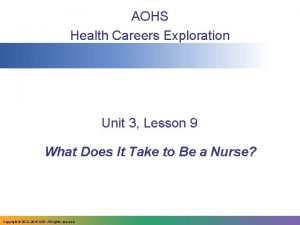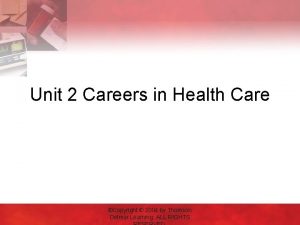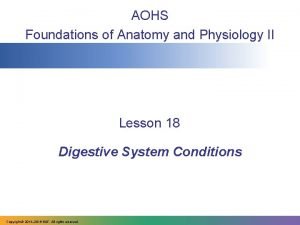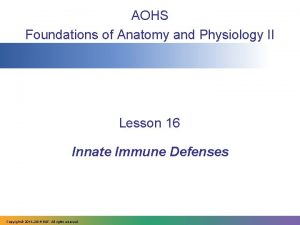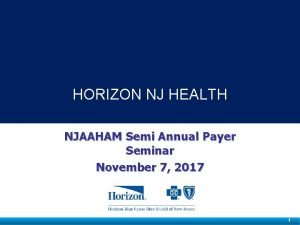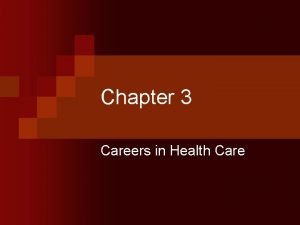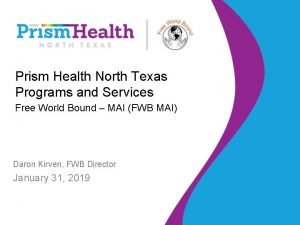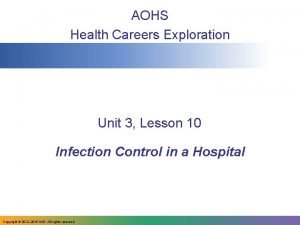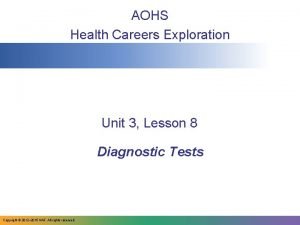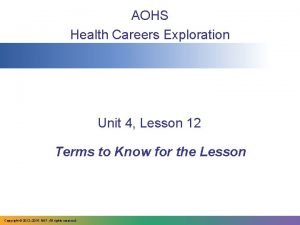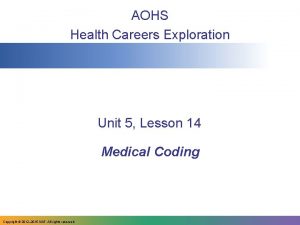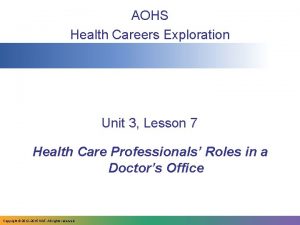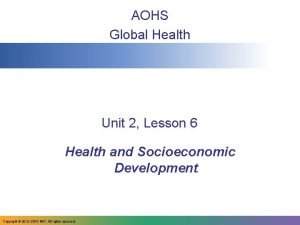AOHS Health Careers Exploration Unit 5 Lesson 14














- Slides: 14

AOHS Health Careers Exploration Unit 5, Lesson 14 HIPAA Privacy and Security Compliance Copyright © 2012‒ 2015 NAF. All rights reserved.

Everybody deserves to have her private information protected Imagine you were working in the labor and delivery unit at Lenox Hill Hospital in New York in January 2012. A woman comes in to have her baby, and her husband is by her side. You realize that it’s Beyoncé and her husband, Jay-Z. What kinds of information might Beyoncé have to tell you as part of her medical care? Why would it be so important for you to keep that information confidential?

HIPAA is the law that deals with patient privacy HIPAA is the Health Insurance Portability and Accountability Act of 1996. Portability: Workers can maintain health insurance coverage when they change or lose their job. Accountability: Standards are set to protect the privacy of health information and regulate how organizations share that information. Organizations are held accountable for enforcing these standards.

Portability protects workers from losing health insurance if they lose their job Before the Affordable Care Act After the Affordable Care Act Portability provided some protection, but it wasn’t guaranteed. Portability is guaranteed. If you lose your job, you will still be insured. Portability varied between states. The government enforces portability. Without portability, families and individuals without health insurance wouldn’t be the only ones to suffer. How do you think portability protects the entire health care system?

HIPAA sets standards to protect patient privacy • Health care workers are required to keep all information about a patient's health private. • HIPAA identifies what information counts as protected health information (PHI) and sets rules about how to make health data anonymous for research purposes. • There are serious consequences for failing to comply with HIPAA.

All health care workers must respect a patient’s privacy • EMRs must be kept secure. • Workers cannot discuss patients in public places. • Workers must keep all information a patient tells them confidential. What reasons can you think of why you would want your medical information kept private?

Protected health information (PHI) includes anything that can be used to identify a patient • Name • Address information • Most dates • Contact information • Identifying numbers such as social security number • Biometric identifiers, including finger, retinal, and voice prints • Full-face photographic images and any comparable images • Any other unique characteristic or code except the unique code assigned by an investigator to code the data Why do you think this information needs to be kept confidential?

Patients have a right to access their own health information • HIPAA identifies an individual patient’s right to access and control his own PHI. • An organization must release PHI if the patient (or the patient’s authorized representative) requests it. • HIPAA sets a standard for how organizations use PHI internally and what they can disclose to outside parties (people or organizations).

HIPAA identifies the circumstances when it is permissible to share PHI Person or organization Reason for access Patient Health professionals Billing offices Requests his or her own PHI Manage treatment Providers Request payment for services Evaluate services using tools such as satisfaction surveys Public health officials Reasons of public interest

Violating HIPAA can lead to fines or jail time Fines • For a mistake, fines can be up to $25, 000 within a calendar year. • For criminally accessing records, fines can be up to $250, 000. Jail time • For criminally accessing records, a person can be sentenced to up to 10 years in prison. What are some reasons criminals might want to access health records?

HIPAA applies to a wide variety of organizations Organization Use of Patient Data Hospitals Record medical data, use data to bill patient/insurance Medical practices Record medical data, use data to bill patient/insurance Insurance companies Use data to determine payments, set rates Billing/collection agencies Use data to bill patients/collect on overdue bills from patients Other organizations May use data for research

Every organization has a privacy officer The privacy officer's job is to ensure that: • All patients are informed about their rights and how their information will be accessed/used. • All employees are trained to adhere to HIPAA. • The organization follows strict privacy rules.

HIPAA sets standards for electronic storage and transfer of health information • Organizations must control who can access data. • Organizations must keep a record of who accesses data and when. • Organizations must have safeguards against hackers and computer malware. • Organizations must adhere to guidelines about transmitting information.

HIPAA is extremely important for all health care workers to understand • It guides how providers communicate information with patients, family members, colleagues, and other organizations. • It establishes standards for safeguarding PHI. • It states patients’ rights for accessing their information and knowing who else can access their information. • It provides guidelines for the use and protection of EMRs.
 Aohs health careers exploration
Aohs health careers exploration Unit 3 lesson 9 health science
Unit 3 lesson 9 health science Unit 2 careers in health care
Unit 2 careers in health care Aohs foundations of anatomy and physiology 1
Aohs foundations of anatomy and physiology 1 Aohs foundations of anatomy and physiology 1
Aohs foundations of anatomy and physiology 1 Aohs foundations of anatomy and physiology 1
Aohs foundations of anatomy and physiology 1 Aohs foundations of anatomy and physiology 1
Aohs foundations of anatomy and physiology 1 Aohs foundations of anatomy and physiology 1
Aohs foundations of anatomy and physiology 1 Aohs foundations of anatomy and physiology 1
Aohs foundations of anatomy and physiology 1 Ggg
Ggg Horizon nj health eft enrollment
Horizon nj health eft enrollment Chapter 3 careers in health care answer key
Chapter 3 careers in health care answer key Chapter 3 career in health care
Chapter 3 career in health care Njhealth horizon
Njhealth horizon Prism health north texas careers
Prism health north texas careers

